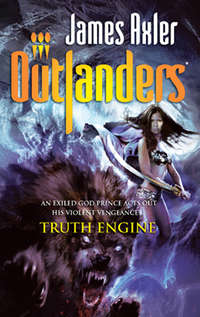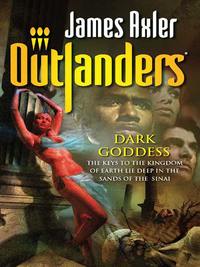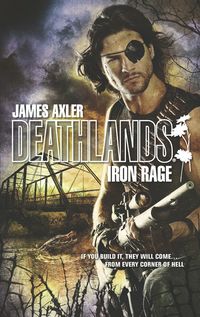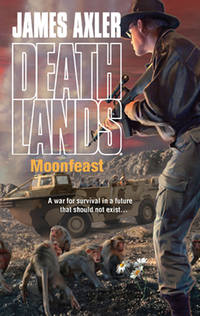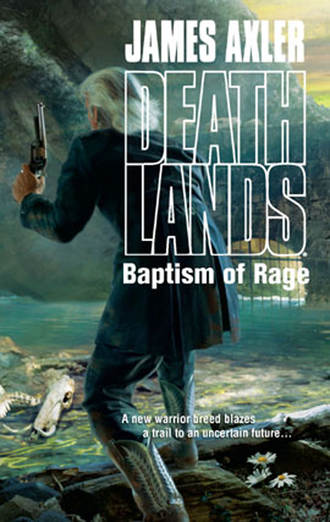
Полная версия
Baptism Of Rage
The first animal bleated again, shaking its head from side to side as Jak turned away and followed his companions into the building. The goat scrabbled forward with its remaining forelegs, the rest of its body following on the wheeled base, until the tether line pulled taut at its neck and halted its progress. It let out another sorrowful bleat as it watched this kindred spirit disappear through the dirty, burn-streaked door.
Jak smelled the air as he entered the run-down shack and a smile touched his pale lips as he scented rich cooking spices.
The room that the companions had entered was roughly twenty feet square, encompassing the full length of the building. To one side, on a raised platform, stood the badly tuned piano, played by an attractive, dark-haired woman wearing a low-cut dress and a single incisor tooth in her open mouth.
Two young women, scantily clad and with collars at their necks, danced lethargically to the clanking tune of the piano, entertainment for the patrons of this trading post. The women, like the goats outside, were tethered together by their collars so that they could go no farther than two feet apart. Also, much like the goats, they looked hungry. Much like the dancers, the patrons seemed to be mostly disinterested, more concerned with feeding their own bellies than watching this lackluster floor show.
Tables were dotted across the room, twelve in all, and customers from all walks, young and old, sat at them, eating and drinking, passing the evening. These were traveling men, like Ryan and his companions, just passing through on their way to pastures new. The group from the caravan had taken up a couple of larger tables to the right of the room; twelve of them in total, plus the baby. They were tending to the wounded mother and her child, bandaging the old man’s bloodied arm. The mother had a wadded bandage across her throat now, but apart from looking pale with shock, she seemed to be all right. With Ryan busy checking on Krysty’s well-being, J.B. touched his index finger to the brim of his hat in acknowledgment as he passed the group. One of them, a man in his fifties with a shaved scalp and peppering of white stubble on his chin, nodded and offered a few words of thanks, but he was drowned out by the poorly tuned piano, and, regardless, J.B. hadn’t bothered to stop and listen. The man with the shaved scalp continued to watch the companions as they made their way toward the main service counter.
A large mirror lined the far wall, overlooking a long countertop that served as bar and trading area. The counter was crowded with things for sale—fur pelts and ammunition, religious symbols and homemade lucky mascots, a writhing box of maggots that was labeled as “live bayt”—all of it presided over by a fat man sitting on a high stool, picking at his teeth with a splinter of wood. The whole lot probably didn’t amount to much of value, even out here in the middle of nowhere, Tennessee, and it was obvious that the trading post’s main trade was in food, drink and the scrawny excuse for gaudies that were currently dancing for the passing trade.
In one corner of the room, at the end of the long countertop, stood a lean-looking, skinny girl of maybe fourteen, stirring a big metal ladle in a steaming pot as big as a bathtub. She wore her dark hair long, and her arms were bare where the burgundy sleeveless T-shirt she wore didn’t cover them. Scars were pitted down her arms, from burns and perhaps blades, it was hard to tell. An open fire cracked and spit beneath the huge pot, casting its fractious, flickering light across the room.
“Well.” Doc clapped his hands together, looking at his companions with a bright smile on his face. “Who’s up for some dinner?” He turned to Krysty, thinking that, after drawing upon the Gaia power, she would be ravenous.
The companions looked at Doc as he stroked his chin unconsciously and his eyes lost focus, seemingly in deep thought. “Though with our journeying of late, mayhap it is lunch. It can get so frightfully confusing when one is ever hopping about from place to place.”
Mildred stepped over and took the older man’s elbow, smiling up into his clear, blue eyes. “Let’s break our fast, you old fool,” she said affectionately.
Doc nodded, smiling agreeably. “Breakfast it is,” he announced before leading the way over to the countertop where the fat man continued picking at his teeth.
As Doc, Mildred and Jak stepped up to the counter, the remaining companions headed for an empty table on the farthest side of the room from the door. The table allowed a good view of the whole room, and J.B. pushed one of the wooden chairs far back until it was pressed against the wall. Once it was, he sat down on it, the brim of his fedora low as he silently scanned the room. Exhausted, Krysty wearily sat beside him while Ryan took a seat facing him, his chair at an angle so that he might turn easily if he was required to face the room.
The patrons seemed a mismatched bunch. Some were quite clearly local farmhands, others just traveling through. There was a sense of hostility, all too familiar in the Deathlands, but it came from the raucous conversations and lewd floor show more than any specific antagonism between parties.
“Lots of ordnance in here,” J.B. said quietly, “not all of it on show.”
Beside the Armorer, Krysty was beginning to regain her usual healthy appearance, the color returning to her cheeks. Her green eyes were sifting through the weapons she could see tucked beneath the tabletops. “Nothing out of the ordinary,” she decided, telling of her findings in a low mutter. “Guy left of the door looks like he has a flamer maybe.”
“No,” J.B. corrected her. “That’s a crop duster, sprays pesticide.”
With his back to the room, Ryan glanced up at the mirror behind the bar, searching for the man in question. “Would it work as a weapon?” he queried.
“Depends what’s in it,” the Armorer admitted. “A face full of bug spray could blind you, burn the skin off your face, or worse.”
“What’s worse than that?” Krysty asked, furrowing her brow.
“Put some industrial-strength shit in there, and you’d be tripping the rest of your short life, see the flesh peeling from your skull whether it was really happening or not,” J.B. explained disinterestedly, his eyes still scanning the room.
At the counter, Doc was addressing the proprietor in his rich, sonorous voice. “Your sign outside promises good eating, sir,” he began, “perhaps you would care to explain what delicacies you have to offer to a band of weary—and hungry—travelers?”
Behind the counter the round man’s tiny eyes widened at Doc’s elaborately phrased request, and he worked his spike of wood with his fingers, pulling something from his teeth, before he spoke. “We got meat,” he said, gesturing to the alcove where the teenage girl was stirring at her large pot, “fresh today and stewed up all nice and tender. That do you an’ your trav’lin’ buds?”
Doc glanced across to the girl in the alcove and nodded, scenting the air in an effort to determine what meat it was. “It most assuredly would,” Doc told the barman. “We would like six bowls of your finest stew. It smells delicious,” he added, turning to check for the approval of his companions.
The overweight barman went over to talk to the rake-thin girl at the bathtub-size cooking pot, and when Doc turned back, he was returning to his post as the girl began reaching for bowls and wiping each with a cloth before placing them in turn on the table beside her. As Doc checked through his pockets for some jack or spare ammunition that might serve as currency—nothing was more valuable in the Deathlands than a live round—the bartender gestured for him to come closer. Leaning forward, Doc bent close to the bar, looking at the bartender curiously as the fat man spoke.
“What’s up with whitey there?” the barman asked, not looking at Jak Lauren. “He a mutie? We don’t much like serving their kind in here. Not for me, y’understand, just that the locals get sore about it and it’s liable to bring trouble.”
“No,” Doc said, shaking his head, “Jak’s as normal as you or I.” Doc considered explaining the nature of albinism but thought better of it. “He just stays out of the sun, that’s all,” Doc finished somewhat lamely.
Which wasn’t to say that they didn’t have a mutie among their band. Few people picked up on Krysty’s mutations, despite her prehensile hair being on show for all the world to see. Doc smiled to himself. In two hundred years, humankind hadn’t changed so very much. People would look past a lot if you were that rare and wonderful combination of facets—tall, striking and a woman.
The man behind the counter told Doc to find a table and his daughter would bring the meals over. As the three companions shuffled past the group from the caravan, one of its crew called to them. The companions turned, and Mildred accompanied Doc as he strode a few paces to join the group. Wary, Jak watched for a moment before slipping through the other patrons and making his way across the room to join Ryan’s table.
A sturdy-looking man addressed Doc as he walked closer, standing up to grasp his hand in a firm, friendly grip. The man looked to be in his fifties, with thinning white hair atop a tanned face and a patchy white beard on his chin. He looked to Doc like a farmer, a man used to working outside.
“You were out there with those what saved us,” the man said, smiling gratefully. “You an’ your friends took some risks there, and we’re mighty grateful.”
“You are very welcome,” Doc said agreeably, as he disengaged his hand from the man’s firm grip.
“My name’s Jeremiah. Jeremiah Croxton,” the man told Doc, gesturing to a free seat at the table. “Why don’t you come sit with us, Mr….?”
“Tanner,” Doc replied automatically.
“Mr. Tanner,” Croxton continued, looking around the shack for other seats. “We would be most honored, if you would come eat with us, both you an’ your friends.” As he spoke, several of his party stood, shuffling their seats along to make more room at their tables.
Doc smiled again. “That is very gracious of you, Mr. Croxton, but we would not wish to intrude.”
“‘Intrude’ nonsense,” the old farmer dismissed with a hearty laugh. “I thinks we may just have us something to interest you, Mr. Tanner. I couldn’t speak for your friends there, but I’m pretty sure you’ll be glad you loaned me your ear for the two minutes or so it will take.”
Intrigued, Doc looked across the table at its inhabitants as Croxton introduced himself to Mildred. The group seemed normal enough, mostly older folks, tired-looking with that hard, leathery skin that suggested long hours toiling in the sun. There were two youngsters among them, besides the wounded baby. One was a girl, perhaps seventeen or eighteen, sylphlike with just a little puppy fat on her pretty face, long, ash-blond hair cascading down her back. Across from her, his eyes on the door, sat a young man of perhaps twenty, hair the same color as the girl’s and with a light dusting of beard on his chin. He seemed hungry to Doc, predatory eyes scanning the room and the door, a bow and quiver of arrows resting at his feet. The next in age was the baby’s mother, who appeared to be perhaps forty years old—it was hard to tell as she was clearly in shock from the attack. A dark-skinned woman with graying hair was gently cleaning the wound at the woman’s neck using a rag dipped in a bowl of water. The water held the pinkish tint of diluted blood.
“Well,” Doc decided, “perhaps just for a moment.”
Beside him, Mildred touched Doc’s sleeve to get his attention. “Doc, I think our dinner is almost ready,” she said, giving him a significant look. Mildred’s time in the Deathlands had taught her that strangers, however kindly they appeared, were almost never to be trusted.
His back to the farmer and his people, Doc gave a sharp nod and mouthed, “It’s fine,” before he spoke aloud. “Perhaps you would alert me when our waitress arrives with our meals, Mildred,” he said.
Mildred rolled her eyes, hoping that Doc knew what he was getting involved in, then walked across the hard wooden floor to speak to Ryan and wait for the serving girl.
As Mildred strode away, a chair next to Croxton was vacated at the table and Doc was invited to join the group. The empty chair was also beside the blonde girl, and Doc offered her a polite bow, little more than a courteous nod, before he sat. She giggled just a little, covering her mouth with her hand as a blush rose across her cheeks. The girl smelled sweet and musky, delicately scented with woman’s perfume. Her youth and long blond hair reminded Doc of another girl, one he had been close to not so very long ago. A treasure of a girl called Lori Quint, who, like everything else in the Deathlands, had been tainted and spoiled and ultimately killed by the unforgiving world around her. Doc pushed Lori’s bittersweet memory aside, as he realized that the bearded farmer, Croxton, was talking.
“The reason I asked that you join us, Mr. Tanner,” Croxton was saying, “is that I do believe we have a little proposition that may be of interest to you.”
Doc inclined his head, inviting the man to continue.
“You see Daisy there,” Croxton said, indicating the fresh-faced, blond-haired teenager. “Pretty as a picture, am I right?”
Nodding, Doc began to feel slightly uncomfortable, concerned that he had come across yet another exercise in an old man whoring his children. “I would say so, certainly,” he replied, amiably enough.
“Would you like to guess how old she is?” Croxton asked, his blue eyes shining, his tongue running across his teeth as a playful smile appeared on his lips. It was the smile of a gambler, someone used to fooling people, and to judging them from their body language.
Shaking his head, Doc pushed his chair back and began to stand. “I am sorry,” he said, “I am really not interested in what I believe you are offering, kind though that offer most certainly is…”
The girl—Daisy—spoke, her voice rich like treacle. “I’m seventy-an’-six, Mr. Tanner,” she said.
Caught halfway between standing and sitting, Doc almost fell over. He reached out and grasped the side of the table before him as his chair crashed to the floor.
“Seventy—” Doc began, the words choked in his suddenly dry throat.
Daisy shrugged her bony, girl’s shoulders and blew Doc a kiss. “I look good on it though, don’t I, sir?”
Chapter Three
“Do you remember what it was like to be young, Mr. Tanner?” Daisy asked, as Doc regained his composure and sank into the chair beside her.
Her voice was low, intimate, with a sweet, rich quality like molasses. Her eyes, a shade of blue so light they appeared almost white, peered at him, the tiniest creases appearing at their edges where she smiled. Her mouth was smiling, too. Her wide, flawless teeth were a dazzling shade of white even in the indifferent, gloomy light. Looking at that friendly, inquisitive smile, Doc felt himself drawn to the girl. There was an intimacy here, created by her soft voice, by the half-light of the room, by the wall of noise all around them as other people continued with their meals and conversations, oblivious to the two of them sitting there discussing the nature of youth.
Realizing that the pretty young girl was waiting for him to answer, Doc nodded slowly. “Oh, I remember,” he intoned. “Long summer days, running simply because you could, running until you fell down with giddiness.”
Doc’s head was still nodding, a smile on his lips, as he looked back at Daisy. He would guess that she was perhaps sixteen or seventeen. Her skin was smooth, crinkles forming and disappearing as she flashed that wonderful, dazzling smile at him, the flesh on her cheeks a ruddy pink in the flickering light from the cook’s fire. He looked at her more closely, trying to see the old woman that she had once been. Her face was round, as though she was predisposed to smile for any occasion, a little chubby around the rounded cheeks, dimples appearing as she smiled. She was pretty, but not beautiful. It was the prettiness of youth, Doc realized, of innocence, the way that only a child could be pretty.
Daisy’s hair was long, falling past her shoulders and ending halfway down her back, a cascading wave of silvery-blond. It was fine hair, wispy and prone to tangle, and she would shift the tangled bangs out of her eyes as she spoke, an unconscious movement, long practiced and harboring no sign of irritation.
As Doc watched the girl, Daisy continued to smile at him. “That’s not it,” she said in that slow drawl that didn’t seem to quite form the hard edges of the words, instead mushing them into a flowing sound, like a song. “That’s—what you are talking about—that’s what you think youth was, because you don’t really remember it. You think it was this thing that was all about being a kid, but that’s nothing like what being young is. That thing that you described, that’s what I thought it was before I was—” She stopped, her eyes wandering as though searching for the rest of the sentence.
“Changed?” Doc suggested after a moment’s pause.
“Youngered,” the girl responded. “Like the way I used to get older, so I guess I got youngered by the pool. That make sense to you, Mr. Tanner? You seem like a man o’ learning, is all.”
Slowly, Doc nodded once again, intrigued despite himself. “Youngered it is,” he replied with a smile.
Daisy glanced up for a moment, and Doc followed her glance. She was looking across the table to where Jeremiah Croxton, the aging farmer, sat. He had spread out an old, dog-eared map across the table and was deep in conversation with the person sitting to his right, another outdoors type. When he saw Daisy and Doc looking at him he smiled in acknowledgment before getting back to his cartographical calculations.
When Doc turned back to her, the blonde girl was holding her hand up before his face, palm toward him, fingers upthrust. “Look at my hand, Mr. Tanner,” she said. “Go ’head, it won’t bite none.”
Doc peered at the girl’s pink hand, wondering at the strange request.
“You can touch it, if you want,” she told him encouragingly.
Doc looked at her quizzically. “What am I looking at?” he asked.
“The scars,” Daisy told him, her lips upturned in a smile. “There’s no scars there, not now. I worked the fields for almost sixty years with my father and then with my better half, the lazy good-for-nothing. But the scars have healed, they disappeared. You wouldn’t know that they was ever there.”
“No, you wouldn’t,” Doc agreed, wondering what else he could say, suddenly aware of his own hands, old and wrinkled.
“That’s being young, Mr. Tanner,” Daisy said with certainty. “No scars, no shooting pains deep in your bones fucking with you when the first frost comes. Not running about in the summer, that’s just some—I dunno—song words, troubadour crap. This is being young, Mr. Tanner—” she flexed her fingers before him “—this right here.”
Doc found his eyes following Daisy’s slim hand as she reached for the glass that sat before her on the wooden table. Behind her, and all around, the other members of the wag train were laughing, drinking and eating, watching the tawdry floor show, enjoying themselves.
Daisy took a drink from her glass and Doc was amused to see that it was a swig, a gulp, not the delicate ladylike operation that one might associate with an adult. “You taste this?” Daisy asked, holding the glass out to Doc.
Doc shook his head, waving away the proffered glass. “That’s very kind,” he stated, “but I should really be getting back to my friends.”
“You should taste it,” Daisy encouraged. “Just a little nip. Won’t hurt you none. It hasn’t chilled me,” she said.
Doc took the glass from her and sniffed at its contents. It smelled of sweetness, some blended fruit concoction. Warily, he held the rim of the glass against his lips and tipped it until a tiny dribble of liquid washed past his teeth and into his mouth. “It’s nice,” he assured Daisy, passing the glass back into her waiting hand. “What is it?”
Daisy’s baby blue eyes were watching him intensely, and the fire of challenge colored her words. “You tell me,” she drawled.
“It tastes like…” Doc began thoughtfully. “I’m not sure. Perhaps cantaloupe? Cantaloupe and some spices perhaps?”
As though performing a show, Daisy placed the glass against her lips, all the while watching Doc, her eyes locked on his. Then she closed her eyes and tipped her head back to drink, her neck arching into a beautiful, pale curve of flawless flesh. As Doc watched, Daisy drank the whole glass, her throat bobbing just a little as she swallowed the last of it. Finally, her eyes popped open—still locked on Doc’s—and, licking her lips, she placed the empty glass back down on the table. “Cantaloupe, raspberry, a hint of berry to add tartness,” she told Doc, “and the spice you could taste—that’s the tiniest fleck of cinnamon.”
Doc looked mystified by this performance. “A tasty concoction,” he assured her when it seemed that she was waiting for him to say something.
Daisy leaned forward, bringing her lips close to Doc’s, speaking low despite the hubbub all around them. “That’s what I tasted, Mr. Tanner,” she whispered. “I could tell each of those wonderful tastes in my mouth, savor every last drop. And that’s what it is to be young.”
The girl pulled away, and turned to speak to the person on the other side of her—a man in his midfifties with the haunted expression of a professional chiller. “You mind, Charlie?” she asked. After a moment, the man—Charlie—got up and made his way to the bar counter to order more drinks.
When Daisy turned back to Doc, who was still puzzling over the meaning of her display, she spoke in a less intense manner, friendly and buoyant once more. “You get old,” she explained, “and things die. Parts of you die. Your taste, your hearin’, your eyes, your sense of smell. You lose things, senses, and you don’t never even notice. Because it takes such a long time to happen, you don’t never see it till it’s too late. You go back, you get youngered and it all comes back, Mr. Tanner. It all comes back and you wonder how you ever managed without it, like some cripple who can’t even dress himself. Those stories about being superhuman—they’re not stories. That’s what it is to be young. The longer you live, the less alive you are.”
Doc looked at her, this simple farming girl, old yet young, wondering at her words, marveling at them.
“Giddy,” Daisy continued, “running in the summer until you fall down—that’s not it at all. You just got too old to remember what it’s really like, is all.”
Doc nodded thoughtfully. “I remember now,” he said, “or, at least, I begin to.”
He sat there, lost in his thoughts as Daisy wrapped her delicate fingers over the new glass of fruit punch that had been brought over by the man with the haunted expression. Jeremiah Croxton leaned across to Doc, tapping him gently just below the shoulder. Doc glanced up, and seemed surprised for a second to find himself looking at the man.
“Mr. Tanner,” Croxton began, “I would like to discuss a proposition that I feel would be of mutual benefit.”
Turning to the old farmer, Doc listened intently to the man’s words.
Chapter Four
J.B. peered over Ryan’s shoulder at the pair of wide tables across the other side of the room, where Doc was held in discussion with the people from the convoy. “What the heck is Doc up to?” he muttered, shaking his head in disbelief.
Mildred was just walking across the room to join Ryan and the others, her brow wrinkled with concern. Ryan peered up as her shadow fell across their table. “What’s happening, Mildred?” he asked.
Still standing, Mildred leaned close, keeping her voice low so as not to be overheard, even in spite of the clashing chords emanating from the piano. “Those travelers we helped out invited us all over to offer a few words of gratitude,” she explained.
“Tell them thanks,” J.B. growled.
“The spokesman,” Mildred continued, “that old boy you see there, he says he has a proposition that may interest Doc. Perhaps the rest of us, too.”



